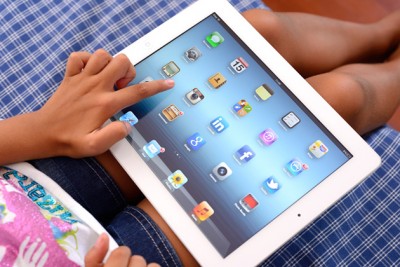 One day, Del Siegle had an epiphany while watching his two and a half-year-old daughter playing with a puzzle game on his new iPad.
One day, Del Siegle had an epiphany while watching his two and a half-year-old daughter playing with a puzzle game on his new iPad.
“She and I had played with this app together, and so when I walked into the room and saw her using it, I said to my wife, ʻDid you turn it on for her?ʼ And she said ʻNo,ʼ” remembers the department chair in educational psychology at UConnʼs Neag School of Education.
“My first thought was, ʻItʼs time to get password protection for my iPad,ʼ” he laughs. “And then I realized how intuitive this device was for her. A couple of years later, our son did the same thing when he was one and a half. I knew this was a powerful tool for them.”
That insight spurred Siegle to create a one-day workshop at UConn for teachers and administrators to show them the wealth of ways such an intuitive tool can be put to use in the education field. Now in its second year, “Teaching and Learning with iPads: Apps Applied” drew about 400 K-12 educators to Storrs on Wednesday, proof of the demand for practical instruction on using the tablet computer in a classroom setting.
And much of it was solid, practical advice, imparted by classroom teachers from around Connecticut: one of the hour-long sessions featured a series of quick tutorials on some of the most popular classroom apps available for the iPad, while another, conducted by Brookfield High School teacher Jennifer Rocca, offered a crash course on using the iPad to make video tutorials.
The sheer range of uses for the device was conveyed by the diversity of workshops and sessions, ranging from art to biology to math to language skills.
“This is something thatʼs applicable in basically every subject field,” Siegle says.
Of course, there are more theoretical aspects of using the iPad in schools, and the one-day workshop offered plenty of guidance there, too. Educators from schools in Branford, Glastonbury, and Willington offered perspectives on the advantages and challenges of huge, “one-to-one” iPad rollouts, in which every student in a school or even a school district is given one of the tablets to use.
“Thatʼs becoming a lot more common, and schools are looking for best practices when it comes to putting an iPad in every studentʼs hands,” Siegle says.
The conference, which had additional sponsorship from the Connecticut Educatorsʼ Computing Association and the UConn chapter of Phi Delta Kappa, has proven tremendously popular, even drawing some educators from other states, and Siegle says he looks forward to planning another one next year.
 Facebook
Facebook
 Twitter
Twitter
 LinkedIn
LinkedIn
